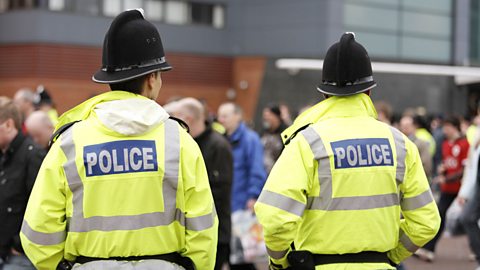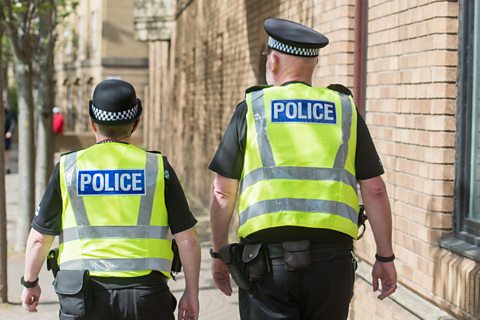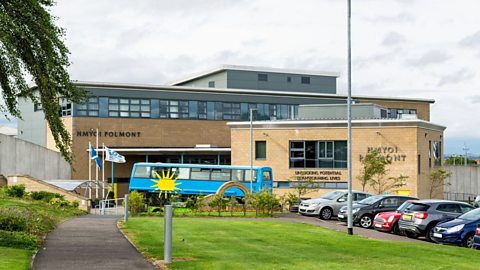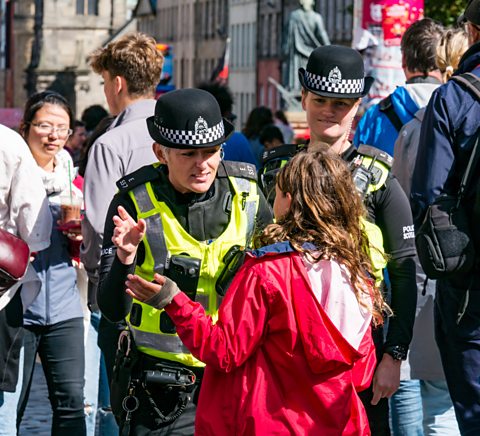Responses to crime - Police
Quick version
Police Scotland is Scotland's single national police force.
Introduced in 2013, it replaced replaced eight smaller regional forces.
- there are 16,600 police officers - the lowest figure since 2008
- between 2013 and 2023, 140 police stations have been closed
The primary duties of police officers include:
- crime prevention
- solving crime
- arresting criminals
- maintaining public order
- traffic management
Are the police in Scotland effective?
- crime rates have been falling in Scotland for many years
- 63% of the public said police are friendly and approachable
- only 54% of crimes were solved in Scotland in 2021-22
- only 29% of people think the police listen to the concerns of local people
Learn in more depth
How are police in Scotland organised?
Police Scotland is Scotland's single national police force and the second largest police force in the UK.
It is accountable to the Scottish Police Authority, which is held to account by Scottish ministers and the Scottish Parliament.
Introduced in 2013, Police Scotland replaced replaced eight smaller regional forces.
The benefits of having a single national force are:
- savings of around £200m per year
- more officers per head of population than the rest of the UK
- no unresolved murder since Police Scotland created
- high detection rates for all crime, especially crimes of a sexual nature
- able to deliver high-profile events to an exceptional standard
(all findings from HM Inspectorate of Constabulary in Scotland Annual Report, 2023-24)
However, some critics believe Police Scotland is too big and links with local communities have been lost.
Scotland currently employs 16,600 police officers. This is the lowest count since 2008 and approximately 900 fewer than when Police Scotland was introduced as the national force.
Around 140 police stations have closed between 2013 and 2023, leading to a reduction in community policing efforts. (Source: 1919 Magazine)
What is the role of the police in Scotland?
The job of the police is to protect the community, prevent crime if possible and once a crime has been committed, apprehend (arrest) those responsible.
Police Scotland officers have several different roles:
- maintaining public order
- crime prevention
- arresting criminals
- managing traffic
- investigating crimes
It is obviously preferable if the police can prevent crimes from being committed. This can involve having a physical community police presence, for example police patrols that are conducted on foot, on horseback, on bikes, or in cars.
Maintaining public order

Much of Police Scotland's most visible work is managing large crowds, for example at big sporting occasions or demonstrations. The priorities are public safety and ensuring that those present do not break the law.
For example, in 2021, 10,000 officers from across Scotland and the wider UK were deployed each day to maintain order during the COP26 climate conference in Glasgow
In recent years, counter-terrorism has been a new Scottish public order issue. Counter-terrorism policy and legislation is reserved to the UK Parliament but the Scottish Government and Police Scotland work closely with other UK police bodies.

Crime prevention
 Image source, IAN GEORGESON / Alamy
Image source, IAN GEORGESON / Alamy It is preferable if the police can prevent crimes from being committed.
A considerable amount of police time and effort is spent on educating people on personal safety and looking after their possessions. They also inform the public of the consequences of particular crimes, such as knife-carrying or drink-driving.
Crime prevention can be:
- at a local level
- for example community police organising Friday Night Football events with local youth groups.
- at a national level
- for example the THAT GUY (started 2021) which aims to reduce assault and harassment by engaging with men about their attitudes to women
 Image source, IAN GEORGESON / Alamy
Image source, IAN GEORGESON / Alamy Arresting criminals
The police can arrest people suspected of committing a crime. They can do this for a number of reasons, eg:
- to take a suspect in for questioning
- to charge someone with a crime if they have enough evidence
- if an arrest warrant has been issued by a court
Police Scotland officers can stop and search a person without having a search warrant if an officer suspects the person of being in possession of any of the following:
- drugs
- an offensive weapon
- stolen property
- alcohol, if travelling to a major sporting event, particularly on public transport
- cash or the cash equivalent of £1,000 or more because of criminal activity
- fireworks, if a police officer suspects that the person intends to use the fireworks in an anti-social manner
Managing traffic
Traffic police have the responsibility of enforcing road traffic laws, traffic management and road safety.
Road traffic offences include the following:
- dangerous driving
- driving under the influence of drink or drugs
- speeding
This is a big part of police work. In 2022-23, road traffic offences accounted for 63% of all offences recorded in Scotland. (Source: Scottish Government)
How effective are police in Scotland?
Although there is no agreed definition of the way in which Police Scotland can be judged effective, it could be argued the police are effective because:
- the amount of crime has been falling in Scotland for many years (Source: Scottish Government)
- surveys of the public show 63% said police are friendly and approachable (Source: Police Scotland)
Some data presents a mixed picture:
- In November 2024, 47% of people were confident that the police deal with crime in their local area
- the overall UK figure was 42%
- 46% of people were not confident that the police deal with crime in their local area
- the overall UK figure was 49%
(Source: YouGov, Nov 2024)
However, Police Scotland has come in for criticism as ineffective because:
- Only around half of crimes (54%) were solved (clear-up rate) in Scotland in 2021-22. (Source: Scottish Government)
- Surveys show only 30% of people think the police listen to the concerns of local people. (Source: Police Scotland)
Other police forces operating in Scotland
As well as Police Scotland, there are several other police forces which operate in Scotland. These include:
- Ministry of Defence Police (MOD) - the MOD Police provide security within Ministry of Defence property across the UK (eg the nuclear submarine base at Faslane)
- British Transport Police (BTP) - the BTP operate across the UK rail network, including the Glasgow Subway.
- Civil Nuclear Constabulary (CNC) - the CNC is an armed force that provides protection for nuclear materials on designated UK nuclear licensed sites and in transit.
- National Crime Agency (NCA) - the NCA tackles serious organised crime across the UK, including Class A drugs, people smuggling and human trafficking, fraud and money laundering.
- Border Force - Border Force is the law enforcement body of the Home Office. Its role is to secure the UK’s borders by controlling the flow of people and cargo in and out of the country’s ports and airports. It does this through immigration checks, searching baggage and vehicles, and patrolling the coastline.
Quiz
Recap what you have learned
Police Scotland is Scotland’s single national police force.
Benefits of a single national force include:
- more police officers per head of population
- higher crime detection rates
- ability to deliver high-profile events
There are currently 16,600 police officers in Scotland, the lowest figure since 2008.
The primary duties of police officers include crime prevention, arresting criminals, maintaining public order and traffic management.
Maintaining public order is mostly visible work, where police are managing large crowds, for example at big sporting occasions or demonstrations. The priorities are public safety and ensuring that those present do not break the law.
The police spend a lot of time on crime prevention, including educating people on personal safety and looking after their possessions. They also inform the public of the consequences of crimes, such as knife-carrying or drink-driving.
Police Scotland officers can arrest people suspected of committing a crime. They can also stop and search a person without having a search warrant if an officer suspects the person of being in possession illegal items, such as: drugs, stolen property or an offensive weapon.
Traffic police have the responsibility of enforcing road traffic laws, traffic management and road safety.
Are the police in Scotland effective?
- crime rates have been falling in Scotland for many years
- 63% of the public said police are friendly and approachable
- only 54% of crimes were solved in Scotland in 2021-22
- only 29% of people think the police listen to the concerns of local people
More on Crime and the Law
Find out more by working through a topic
- count5 of 9

- count6 of 9

- count7 of 9
